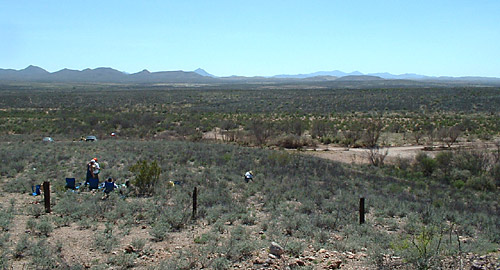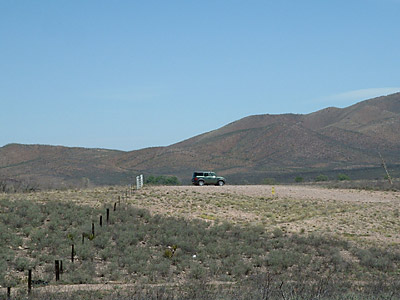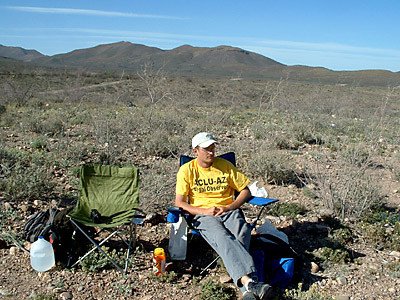Minuteman Project Misconceptions - Confessions of two Indymedia Reporters

In the weeks leading up to the Minuteman Project (MMP), all I knew was that "armed vigilantes" would be coming to Arizona to take the law into their own hands and stop the flow of "illegal aliens" across the U.S.-Mexico border. Most of what I knew came from activists or the media.
On April 1, the start of the project, I was terrified. Nearly 60 protestors showed up in Tombstone, Arizona to demonstrate against the "armed, racist" people to show the Minuteman volunteers and the media that Arizonans were not going to tolerate this type of behavior and that there were opposing voices.
What I did not realize until now, is that before laying an eye on a Minuteman volunteer, my view of them was already biased and tainted. True, real vigilante activity has been documented across the border region before, but it was the activist groups and the media that immediately tied the MMP to this behavior, labeling what they would do before things happened.
The opening weekend of the MMP was an absolute media circus. Hundreds of media representatives, from all over the world, swarmed southern Arizona. Often times, there was more reporters than actual Minuteman volunteers and/or protestors. The media was interested because of the "sexy" appeal of "red-necks with guns coming down to take the law into their own hands" and wanted to be there to document the moment someone was shot or illegally detained. After the buzz of the weekend, most of the media left, leaving just a few reporters and documentary projects around.
First, the majority of the Minuteman volunteers are not "scary vigilantes." While many of them are armed, it is likely it is because they are NRA enthusiasts, not people who have come to Arizona to shoot people. Most of the volunteers are in their 40-50s and are white males. Their duties are to sit in chairs or in their trucks and watch the border for 8 hour shifts. If they actually see an undocumented migrant, they radio in to the MMP command center and call U.S. Border Patrol. Some have gone out on foot and helped Border Patrol agents look for migrants hidden in washes. Except for one or two individuals, I have not felt threatened or scared by any of the volunteers. (I am a 24 year old female.)
After getting "the story" the first weekend, meaning the story that most media tried to tell, I returned to the border last weekend with a different angle. After talking with border activist groups, both Chris Simcox and Jim Gilchrist, MMP organizers, and several of the volunteers, I picked up on an interesting detail. There are many similarities in beliefs between the border activist and humanitarian groups and the Minuteman volunteers when it came to the "border problem." For example, both groups of people would likely agree that: our border policy is messed up, the Bush administration is not trying to fix the problem, the guest worker program needs to be improved, U.S. businesses need to pay higher wages and offer benefits to immigrant labor, that U.S. foreign economic policy is largely to blame, free trade policies hurt both Mexicans and Americans and that the borders are not secure when it comes to drug traffic and possible terrorist threats.
As a reporter, I found these similarities striking. But, why then were some people joining border activist groups to offer humanitarian aide to immigrants and working on policy, why others were deciding to come to the Arizona-Mexico border for a week or a month to help shut it down?
With that pivotal question, I spent last week interviewing Minuteman volunteers trying to get at why they decided to devote time and personal resources to this project as a solution to the border problem.
Without my notebook and camera, I approached Minuteman volunteers just to talk. I had my press pass on, but came across as a non-threatening journalist, someone who was more interested in talking than just getting a quote. With each volunteer or team of volunteers, I would ask them how they felt the media was covering their project, what their general sources of media are, and why they thought defending the border was the solution, rather than tackling NAFTA or other economic policies.
Some of my conclusions are that many of the volunteers get their news off of corporate broadcast news channels, predominately FOX news. They also rely on their local newspapers. Many of them were unfamiliar with the consequences of NAFTA, and how that correlates to "the flood of illegal aliens streaming across the border." This I believe is related to the inability of the mainstream news services, in particular broadcast news, to holistically and adequately cover issues. While the media is good at producing "fear stories" about crime, violence, terrorists, etc., they are not very good at focusing on an issue in the long term and trying to truly find the truth and report it to their viewers.
My opinion is that the MMP is a consequence of the state of the media in three respects. First, it is Americans becoming scared by what they learn from the mainstream media, and finally taking action they believe will solve the problem. Secondly, most of the Minuteman volunteers have bad information, thus are reacting to a situation that is based on incomplete facts and details. Thirdly, due to the lack of international-focused stories and the patriotic focus of the media since 9/11, many feel that the MMP is about defending the United States and our freedoms.
As part of the conversations with the Minuteman volunteers, I would tell them about indymedia and the independent media movement, and what is wrong with the mainstream media. All of the people I spoke with were very receptive to this, and many had heard of alternative media. I had fliers prepared that described some facts about media conglomeration, indymedia, alternative media and literature and how to publish on indymedia. I gave these out and I believe they were welcomed. One Minuteman volunteer told me that I was the first person that made things click for him about the border situation and that we was going to look into Democracy Now! and watch the movie "Outfoxed."
Because I think the mainstream media is largely to blame for the misconceptions that have led hundreds of people to join the Minuteman Project, I think media activism is the only way to approach the volunteers to tell them that further militarization of the border is not the solution to this global crisis. No border activist groups have been proactive in approaching the Minuteman volunteers to educate them, nor have the leaders of the MMP decided to hold "teach-ins" to further enlighten people within their own movement.
I urge anyone going to the border in the next couple weeks to approach the Minuteman Project volunteers with an open mind and heart, and rather than immediately brand them as "crazy vigilantes," rather spread the word about alternative media. Please contact me if you are interested in this endeavor.
Walt
I only spent a day on the border as a legal observer, watching a handful of people who had their eyes trained on Mexico. That was nearly a week ago, and after thinking and talking about it, I think the Minuteman Project (MMP) has made me much more critical of ourselves than these so-called vigilantes.
I expected to arrive at the border and see a line of pissed-off, racist vigilantes waiting for a group of Mexicans to make a desperate dash through a hole in the fence right into the barrel of a gun.
Instead, I found myself growing upset with the activists opposing the MMP and their rhetoric that shaped my views of them.
Right now, the border is like a huge classroom with pupils all sitting at their desks, pencils sharpened and waiting for their teacher to show up. But the teacher never does.
The project’s organizers, Jim Gilchrist and Chris Simcox, do not seem interested in hosting teach-ins on economics and U.S. history. Border groups like Border Action Network, BorderLinks and the others, as far as I know, haven’t planned to hold any movie screenings or discussions on migrant labor for the Minute(wo)men. The only thing I’ve read about are continued protests and opposition to them.
So, then, what do we need to do? Listening, learning and teaching.
Honestly, the biggest problem the MMP’s volunteers are facing is boredom. There’s nary a migrant for miles from where they are situated – the Mexican government and aid agencies have done their best to let people know not to cross west of Douglas until April is over. After spending the better part of seven hours watching the minute(wo)mens’ every movement, it’s obvious they are bored out of their gourd. Some stay put, others slowly drive from outpost to outpost, like an old fashioned game of telephone, passing along news and rumors.
Basically, they’re all sitting out there wondering why in the hell they’re sitting out there. They, also, have been lied to.
We need come up with something to reach these people (and perhaps ourselves?)
A couple days ago, I read on Indymedia.us that a group of human rights activists from California was coming to protest in Douglas. But now, I can’t say I’m looking forward to that, unless they’ve got something really constructive planned. If not, here are some ideas:
Listen to these minute(wo)men. They have interesting stories and experiences. They are confused and afraid. They don’t know why Bush won’t seal the border. They don’t want drug dealers in their towns. They don’t want their hospitals going down the tubes. Are these not valid concerns, especially knowing what the media spews at them on a daily basis. So go and listen to them, don’t interrupt. Hear what they have to say.
Yes, many of these people are racist, some subtly, some overtly, although it seems to come more from nationalism and fear than hate for a certain skin color. But listen to that too.
Then, after offering a sympathetic ear, try a conversation. Many of them would support a legalized guest worker program. Maybe we could explain how that would grant migrants higher wages, which is something that corporations (aka U.S. government) don’t want. We could talk about NAFTA, now it has tightened the noose on the Mexican government and caused many people to lose their land, driving them to attempt the perilous journey into the States for work. Although it may seem like migrants are a drain on many of our systems, they are hard working and many have taxes and Social Security taken out of their wages.
And, many return home to Mexico or Central America. But since the border has been more heavily militarized, it’s harder to return, so more and more are staying and keeping their families here. This list can go on and on...
After this, maybe we could have a sheet with some resources: books, movies and web sites. My latest favorite is Confessions of an Economic Hit Man by John Perkins.
What we really need to do is set up an infoshop on the border and let the MMP volunteers check out books, fliers and zines for the day. We should find a venue to screen Out Foxed and The Corporation each night for the rest of April. We should be leading discussions with them, finding out what kinds of solutions would really benefit everyone involved. Maybe some of them would then go home and start harassing their congressmen and senators for immigrant rights.
If we don’t do this kind of work, then I don’t know what activism is, or at the very least, I don’t want to be a part of it anymore. They call us lazy, jobless communists. We call them consumer-driven, racist right-wingers.
I say we all have a lot to learn from each other.
Now, I don’t defend the MMP to the slightest, but I think we’ve got a great opportunity to reach out to a group of people we rarely have the opportunity to talk to. There are hundreds of them, all day long, just sitting in lawn chairs staring through binoculars into an endless sea of desert chaparral. They want to chat, to learn, to teach, to understand.
So pack your bags with some literature, but also bring a healthy dose of patience and empathy. Leave the signs, slogans and bullhorns at home. See you at the border at high noon!
Get Involved
If you'd like to help with maintaining or developing the website, contact us.
Publish
Publish your stories and upcoming events on Indybay.




